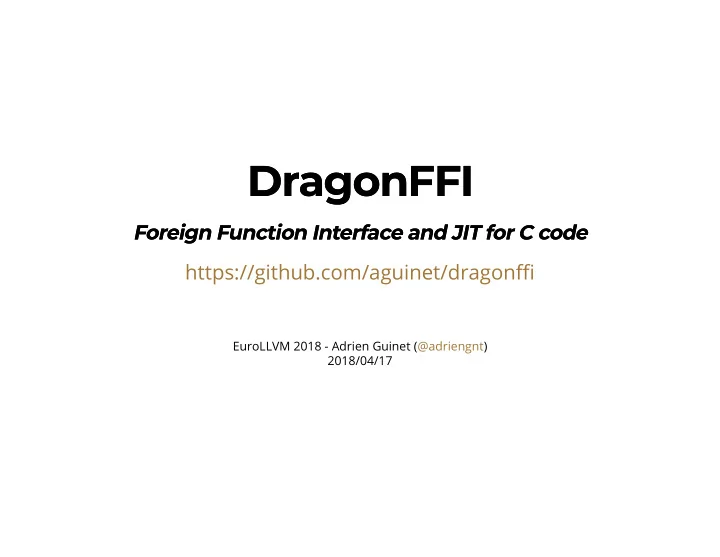

DragonFFI DragonFFI Foreign Function Interface and JIT for C code Foreign Function Interface and JIT for C code https://github.com/aguinet/dragon� EuroLLVM 2018 - Adrien Guinet ( @adriengnt ) 2018/04/17
Content of this talk Content of this talk whoami FFI? (and related work) FFI for C with Clang/LLVM What's next
Whoami Whoami Adrien Guinet ( @adriengnt ) Quarkslab Working on an LLVM-based obfuscator
FFI? FFI? Wikipedia : A foreign function interface (FFI) is a mechanism by which a program written in one programming language can call routines or make use of services written in another. In our case : (compiling and) calling C functions from any language Python code calling a C function import pydffi CU = pydffi.FFI().cdef("int puts(const char* s);"); CU.funcs.puts("hello world!")
What's the big deal? What's the big deal? C functions are usually called from "higher" level languages for performances... ...but C functions are compiled for a speci�c ABI There isn't *one* ABI, this is system/arch dependant It's a huge mess! => We don't want to deal with it, we want a library that makes this for us!
Related work Related work libffi : reference library, implements a lot of existing ABI and provides an interface to call a C function ffi_cif cif; ffi_type *args[] = {&ffi_type_pointer}; void* values[] = &s; ffi_prep_cif(&cif, FFI_DEFAULT_ABI, 1, &ffi_type_sint, args); s = "Hello World!"; ffi_call(&cif, puts, &rc, values); cffi : uses libffi to provide this interface to Python, and uses pycparser to let the user de�ne C functions/types easily
Why another one? Why another one? : libffi : far from trivial to insert a new ABI (hand-written assembly) ; the ms_abi calling convention under Linux isn't supported. cffi : does not support a lot of C construction: cffi.FFI().cdef("#include <stdio.h>") CDefError: cannot parse "#include <stdio.h>" :2: Directives not supported yet </stdio.h></stdio.h> cffi.FFI().cdef("__attribute__((ms_abi)) int foo(int a, int b) { return a+b; }") CDefError: cannot parse "__attribute__((ms_abi)) int foo(int a, int b) { return a+b; }" :2:15: before: ( I want to be able to use my libraries' headers out-of-the box!
FFI for C with Clang/LLVM FFI for C with Clang/LLVM Why Clang/LLVM? Why Clang/LLVM? Clang can parse C code: parse headers to gather de�nitions (types/functions/attributes...) Clang support lots of these ABIs, and LLVM can compile the whole thing So let's put all of this together \o/
FFI for C with Clang/LLVM FFI for C with Clang/LLVM Gather C types Gather C types Using DWARF debug information from the LLVM IR: typedef struct { short a; int b; } A; void print_A(A s) { printf("%d %d\n", s.a, s.b); } $ clang -S -emit-llvm -o - -m32 a.c -g !11 = distinct !DICompositeType(tag: DW_TAG_structure_type, size: 64, elements: !12) !12 = !{!13, !15} !13 = !DIDerivedType(tag: DW_TAG_member, name: "a", baseType: !14, size: 16) !14 = !DIBasicType(name: "short", size: 16, encoding: DW_ATE_signed) !15 = !DIDerivedType(tag: DW_TAG_member, name: "b", baseType: !16, size: 32, offset: 32 !16 = !DIBasicType(name: "int", size: 32, encoding: DW_ATE_signed)
FFI for C with Clang/LLVM FFI for C with Clang/LLVM DragonFFI type system DragonFFI type system DWARF metadata are parsed to create DFFI types: All basic C types (w/ non standards like (u)int128_t) Arrays, pointers Structures, unions, enums (w/ �eld o�sets) Function types Every type can be const-quali�ed!
FFI for C with Clang/LLVM FFI for C with Clang/LLVM Calling a C function Calling a C function A DFFI function type is parsed to create a function call wrapper: // For this function declaration int puts(const char* s); // We generate this wrapper void __dffi_wrapper_0(int32_t ( __attribute__((cdecl)) *__FPtr)(char *), int32_t *__Ret,void** __Args) { *__Ret = (__FPtr)(*((char **)__Args[0])); } Clang handle all the ABI issues here! Clang emits the associated LLVM IR, that can be jitted, and there we go!
Usage examples Usage examples
What's next What's next Support parsing of debug informations from shared libraries Support parsing of debug informations from shared libraries directly! directly!
What's next What's next Support parsing of debug informations from shared libraries Support parsing of debug informations from shared libraries directly! directly! Work in progress: Debug information can be huged: https://github.com/aguinet /llvm-lightdwarf : experimental LLVM pass that reduces debug info to the things we need (from 1.8Mb to 536KB for libarchive) Merge all the compilation units into one Idea: static FFI compiler: generate a mylibrary-ffi.so that contains wrappers and reduced DWARF informations!
What's next What's next Reducing binary size: pydffi.cpython-36m-x86_64-linux- gnu.so is 55Mb. Two versions: "core": w/o clang, only the ABI-related part. Very close to what lib� does! "full": optional module w/ clang JIT and optimize the full glue from Python/Ruby/... to the C function call (easy::jit?)
Thanks for your attention! Thanks for your attention! https://github.com/aguinet/dragon� pip install pydffi For Linux/OSX/Windows users! Twitter: @adriengnt Mail: adrien@guinet.me
Recommend
More recommend